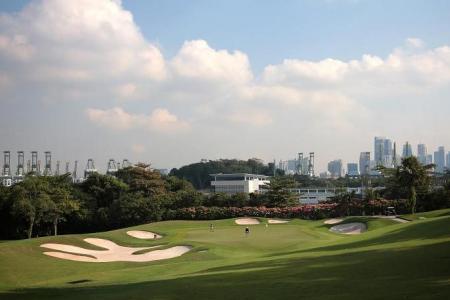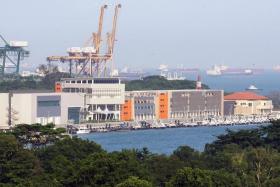Man’s death after playing golf not due to booster taken three weeks before
The wife of an American analyst who died in November 2021 after a game of golf raised concerns over whether his death was caused by a Covid-19 booster shot taken three weeks earlier.
However, a report by State Coroner Adam Nakhoda on Wednesday said Mr Seung Jun Shin’s death was from hypertensive heart and coronary artery disease, which are chronic illnesses, and there was no evidence that the vaccination caused his death.
The report said Mr Seung, 48, took his Pfizer-BioNTech/Comirnaty booster dose on Nov 6, 2021. His wife said he complained of chest pains a few times after, but did not seek medical attention.
He played 18 holes of golf with three friends at Sentosa Golf Club on the afternoon of Nov 27. His friends reported that he did not display any signs of discomfort, fatigue or illness during the game.
But four hours later, after the game, Mr Seung sat down suddenly while climbing a flight of stairs towards the clubhouse, complaining that he was tired and wanted to rest.
The club’s assistant golf executive was notified, but Mr Seung declined to have an ambulance called or to move to an air-conditioned room.
But an ambulance was called after Mr Seung collapsed backwards and lay on the staircase, supported by his friends.
A Singapore Civil Defence Force operator called the assistant golf executive, who was instructed to check Mr Seung’s breathing and pulse, and found both had stopped. Following instructions over the phone, the man brought Mr Seung to level ground and started cardiopulmonary resuscitation on him.
This happened about seven minutes after Mr Seung had collapsed. He regained a weak pulse after defibrillation, but did not have a pulse as he was taken to Singapore General Hospital, where he died despite resuscitation efforts.
The forensic pathologist who supervised Mr Seung’s autopsy noted that his heart was twice the size of that of an adult male.
State Coroner Nakhoda said the severity of Mr Seung’s coronary artery disease would have taken time to manifest, and it was highly improbable that it developed in the time after his booster dose.
Mr Seung’s wife said he was on medication after he was diagnosed with high blood pressure about four years before his death, but the coroner noted that he was either taken off or stopped the medication after his condition reportedly improved.
“Unfortunately, it was likely that Mr Seung continued to have high blood pressure that was not controlled by medication.”
Apart from concerns over the vaccine, Mr Seung’s wife also asked why it took golf course staff so long to bring Mr Seung to a flat surface and conduct CPR.
State Coroner Nakhoda said it would have been preferable, in a similar situation, that a casualty be moved to the flat surface at the foot of the staircase as soon as possible after he or she stopped breathing.
He said CPR should then been commenced immediately if there were trained people available or as soon as they are instructed on how to do so by SCDF operators.
In this case, the golf course staff should immediately retrieve the nearest AED and have it ready to be used after Mr Seung collapsed.
“But whether there would have been a different outcome had CPR been started on Mr Seung earlier or had he been administered with shocks from the AED sooner, is highly speculative and is outside the remit of this court,” he added.
Get The New Paper on your phone with the free TNP app. Download from the Apple App Store or Google Play Store now


